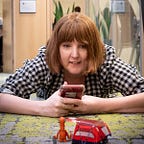A day at Parliamentary Digital Service
Part 1 of my “Being Nosy” series
I work part-time, and I recently decided to use my “non-working day” to find out more about other government departments, or similar organisations and how they work. You can find out more about my plans in this blog.
I’ve been lucky to have had lots of offers, and for my first excursion I had a great offer from fellow weeknoter Dan, Head of Data and Search at Parliamentary Digital Service.
I’ll be honest. I’ve been reading Dan’s weeknotes for a long time and, even though I know a fair bit about his team, I was conscious that I didn’t know much more about the rest of PDS or how they work. So I hoped I would be able to come away with a better understanding of the structures, set up and wider context.
Luckily Dan invited me along to their “extravaganza” a half day update by the different areas of his team, with attendance by their Director, Emma and new CTO, Ray.
Before heading to the meeting Dan gave me an overview. I drew something resembling an organogram and got my first glimpse of just how varied the activities of the team really are. To come to this meeting then, would be the perfect way to get an overview of all of their activities and learn more about the work.
The extravaganza started with an overview by Dan which included the team objectives, which are neatly published in the open here.
First up to speak was Anya. She talked about the work they have done on data modelling, understanding the data being produced and the relationships between data.
Second came Ben, with a presentation about Civic Value. He posed some questions around the role of parliament and the impact of technology on performing civic responsibilities. It’s such an interesting question and one which you could easily spend a full day talking about.
Jamie talked about the relationship between the dev team and the data and search team and about how the data platform underpins all of the ongoing work on the Beta website for Parliament. He also talked a little about search and bringing content out of silos, really important for a website which currently has around ten types of search for it’s varying elements [1]. But more of that later.
Samu talked about how the data platform interacts with business systems or data sources which are already in place (such as Ellie at GDS’ registers data), uses the domain modelling work to check the structure, or, turns it into something which can then be used to serve content to the public via the website.
Chris then showed the data modelling as it is used by the data platform, a massive spidery entity diagram. It was slightly mind blowing.
The team also talked about data APIs which they plan to make available. Rod talked about documentation, and the team spoke about the importance of that, not just for internal use but for any public or organisations wanting to use the Data or API. It was really good to see that the team plan to make data not just open, but also do the work of explaining it to users.
One of my favourite parts of the day was Robert speaking about and demoing the new search functionality on the Beta site. I was really impressed with the focus on, giving the public a way to search that they will be able to understand, bringing content out of silos. This part of the day really made the whole thing come alive for me and brought home the reasons for undertaking all of this work.
Liz and Sara spoke about testing and running experiments on the Parliament Beta site as well as gathering feedback and using API call data to help them to understand more about how people are finding information.
Finally Mat spoke very briefly about corporate management information dashboards.
So what did I think?
- For what wasn’t much more than half a day I was very tired by the end of it! Taking in so much information about other teams is tiring but so rewarding. I still feel like I’ve only just scratched the surface of what I know, but I have some idea and that’s good.
- The Data and Search team have a really varied set of activities, and it felt as though getting across the range and scale of some of the work could be difficult at times.
- It felt to me as though each of the people speaking at the extravaganza could have easily held the floor for a much longer and more interactive session.
- It struck me that these extravaganzas aren’t hugely regular and so when they do happen there is a lot to fit in. Dan was really conscious that a couple of members of his team didn’t have the opportunity to speak because we ran out of time. I know that was done to enable other people to attend, but I suggested maybe holding them more regularly so that people could speak on themes for longer, not sure if that’s helpful but I was glad I could spot an opportunity.
- I really enjoyed being a newbie and being able to ask lots of “stupid questions”. Stupid questions always seem to be the ones which tell you the most because they make people reflect on where they’ve made assumptions about people’s knowledge. It’s more difficult to do that when you’re embedded in a team I think. I wouldn’t want to put words into his mouth but I think Dan found it handy to have an outsider reflect on what they’ve seen, and I hope it’s been helpful.
[1] Don’t believe me? It’s true, I dare you to go and look.
